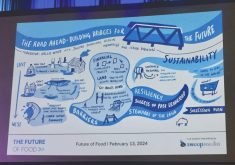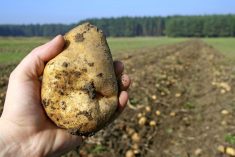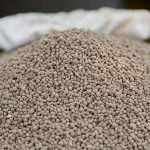A consortium of companies behind the province’s first major pulse fractionation plant are vowing to “take plant-based protein extraction to the next level” at the new facility being built in Bowden.
And part of that is making pulse ingredients that don’t taste like pulses.
“Our emphasis is on processing functionality,” said Kevin McGeough, CEO of More Than Protein Ingredients. “Our goal is to develop the capacity to rapidly develop new products for food manufacturers to produce the plant-based foods of the future, and to build a supply chain and manufacturing facility that works toward carbon neutral, while adding net-zero waste and supporting local farmers.”
Read Also

‘Millions will die’: Foodgrains Bank faces $2.7B federal funding threat
Foodgrains Bank warns $2.7B aid cut triggers a humanitarian crisis, risking global hunger relief and 40 per cent of its funding.
Construction of the new $100-million facility began last fall and the operation will open next year, McGeough said at a news conference announcing that Protein Industries Canada, the federally funded ‘supercluster,’ is putting $5.7 million into the project.
More Than Protein Ingredients also announced a partnership with a pair of companies that will help it develop very specific types of protein, starch and fibre ingredients for plant-based food companies.
That will be key for companies that will succeed in the rapidly expanding plant-based food sector, said Bill Greuel, CEO of Protein Industries Canada, a government-funded organization created four years ago to foster a ‘supercluster’ of plant protein companies on the Prairies.
Sales of plant-based foods — essentially replacements for meat, dairy, and fish — are expected to exceed $250 billion by 2035, said Greuel.
But it’s a sector that is also constantly looking for new and improved ingredients with very specific attributes, said McGeough.
“Food manufacturers are looking for plant-based ingredients that deliver better functionalities and improved sensory experiences for their customers,” he said.
For example, many plant proteins have an earthy, grassy, bitter aftertaste, which gets passed on to starches and fibres. But one of the new partners — Quantum Mechanical Technology Inc. from Prince Albert, Sask. — has developed technology that preconditions pulses before processing in order to get rid of these flavours and produce more neutral-tasting components.
“Product components will be analyzed with zero negative attributes being the desired outcome,” said Leonard Yungwirth, the company’s chief operating officer.
“The primary product tested will be yellow peas and sweet yellow lupins.”
Quantum Mechanical Technology’s equipment will also get rid of yeast, moulds and bacteria on crops when they arrive at the facility. The technology will be able to stop enzymatic activity within the products to improve their stability and shelf life, said Yungwirth.
The other partnering company, Hamman Ag Research in Lethbridge, will be working on the agronomy side, particularly on raising protein levels in yellow peas. The company will be evaluating pea varieties and management practices.
McGeough was enthused about what the companies will be doing inside the plant.
“Our project focuses on building our innovative seed-to-plant-protein-ingredient supply chain,” he said. “More than protein’s contribution to this project is to develop a leading-edge innovation commercial-scale plant-based protein line… This line will play a pivotal role in development of new plant-based proteins, starches, fibres and sugars.”
The company is also taking a zero waste approach in the plant design, with the goal of seeing byproducts used by pet and livestock sectors as well as other industries such as bioplastics.
The provincial government views plant-based food ingredients as a major opportunity for growth and diversification in Alberta’s food-processing sector and is working to bring more facilities here, said the provincial ag minister.
The government is working on 10 new plant-based protein projects, with a potential investment of more than $165 million, said Nate Horner.
















